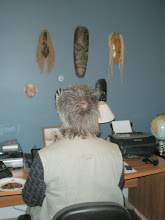Putting out of our minds the wrongs others had done, we resolutely looked for our own mistakes. Though a situation had not been entirely our fault, we tried to disregard the other person entirely. The inventory was ours, not the other man's. (This is patently unfair. My ability to spot defects in others is unparalleled and my faults so minor, few, and far in between as to not be worth inspection. What is it that Jeebus says? "So why do you see the piece of sawdust in another believer's eye and not notice the wooden beam in your own eye?" That kooky Jeebus.)
The first thing apparent was that this world and its people were often quite wrong. To conclude that others were wrong was as far as most of us ever got. (Sometimes real fucking slowly.)
Our present anxieties and troubles we cry are caused by the behavior of other people. . . To see how erratic emotions victimized us often took a long time. We could perceive them quickly in others, but only slowly in ourselves. (Again with the other people. Again with the blaming thing. Again with the suggestion that we're a little too quick to find fault in others and a little too slow to see our own.)
Or if my disturbance was seemingly caused by the behavior of others, why do I lack the ability to accept conditions I cannot change? If I am unable to change the present state of affairs, am I willing to take the measures necessary to shape my life to conditions as they are? It never occurred to us that we needed to change ourselves to meet conditions, whatever they were. (My heart soared for a moment at the initial suggestion that other people really WERE the cause of my problems. Alas, the euphoria was short-lived. And it's back to me. Back to me working on me.)
The moment we ponder a twisted or broken relationship with another person our emotions go on the defensive. (It's not me - it's them.)
Finally, we begin to see that all people . . . are to some extent emotionally ill as well as frequently wrong, and then we approach true tolerance and see what real love for our fellows actually means. We realized that the people who wronged us were perhaps spiritually sick. Though we did not like their symptoms and the way these disturbed us, they, like ourselves, were sick, too. (
So our troubles, we think, are basically of our own making. They arise out of ourselves, and the alcoholic is an extreme example of self-will run riot, though he usually doesn’t think so.
This is such an important part of my recovery that I choose to highlight in blood red ink. I can almost always put my troubles into one of two categories: (a) troubles of my own making and (b) stuff that happens to everyone all the time but really seems unfair when it happens to me which is why I do so much bitching about things that are . . . you know . . . really pretty common and normal.

No comments:
Post a Comment